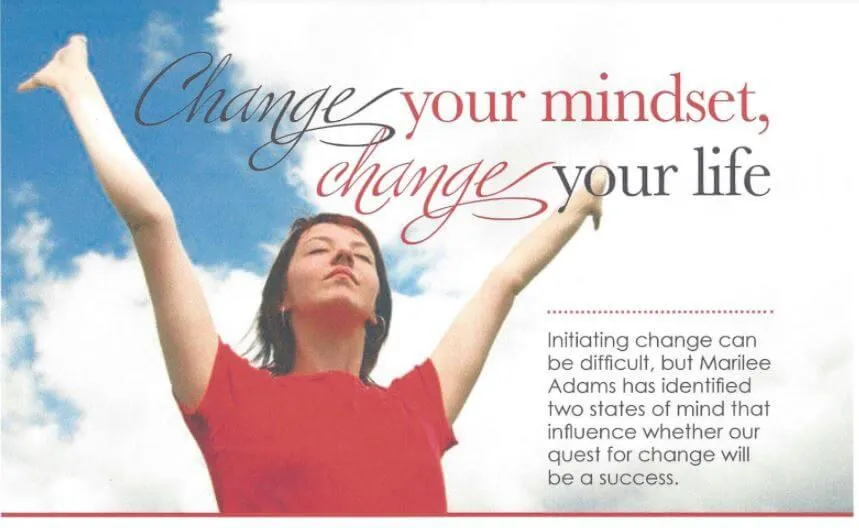Blog

Change Your Mindset, Change Your Life
Most of us believe that change is hard, even when it’s something we want. Unfortunately, the daunting belief about the “inevitable” difficulty of change is why so many of us give up, sometimes even before we start. While change can be challenging, I believe the biggest obstacle is simply not knowing how to change— regardless of which of these two kinds of change you’re facing. The first kind is when you initiate change for something you want; perhaps to make changes in a habit (like exercising or eating) or in a relationship (either in your personal or professional life).
The second kind of change is when you’re forced into it by persons or circumstances outside yourself, for example, when a partner ends your relationship or the company you’re working for downsizes and you’re out of a job. In such cases, you didn’t choose what happened and are probably quite unhappy about it. Yet in both cases, changes are called for. The good news is that change is much easier when you realize that the most powerful place to begin is always the same—with yourself and the mindset you bring to the situation.
Change is all about mindsets
Every one of us has two basic mindsets, which I call Learner and Judger. While both mindsets are part of our nature and quite normal, they affect us in very different ways. In fact, one of these mindsets creates obstacles to change while the other creates new possibilities. Like the weather, our mindsets shift frequently, often moment by moment. While we can’t change the weather, you can change your mindset. Happily, there are mindset tools that greatly simplify this process. By understanding these two mindsets you gain the power to observe how they are shaping your mood, thinking and even your actions. This understanding also empowers you to ask yourself what I call “Switching questions” for transitioning from one mindset to the other. I know the Learner Mindset System works because thousands of people who’ve read my books or attended my workshops have shared their successes with me.
Let’s begin with the Learner mindset: this mindset is responsive, optimistic, open-minded, curious, and creative. When we’re “in Learner” we typically experience moods of hope and possibility. Our Learner way of being is thoughtful, connected and flexible, which helps us relate to ourselves and others in win-win ways.
What about Judger mindset? At its extreme, this mindset is reactive, pessimistic, close-minded, judgmental, and dead-set on being right. When we’re “in Judger” we typically experience moods of negativity, conflict and stress. The Judger way of being is critical and inflexible. When Judger is in charge, we end up relating to ourselves and others in win-lose ways.
You can easily guess which mindset helps with change and which one hurts, regardless of the kind of change you’re facing. Remember: we all have both mindsets and they can change from moment to moment. The big question to ask yourself is: “Am I in charge of my mindset or is my mindset in charge of me?”
Changing mindsets by changing questions
I’d like to introduce you to two coaching clients, Carla and Fred who sought coaching for quite different reasons. Carla had tried to initiate a change in her life and failed. Fred had been forced into making changes and was also failing. My work with both of them centered on teaching the impact of their mindsets so they could learn to navigate successful change.
Carla wanted to stop being a coach potato and had decided to start a new routine of walking every single day. But every time she missed a day, she beat herself up and finally got so discouraged that she stopped trying at all. She decided to get some coaching and try again, hoping that would make a difference. We discovered that she was asking herself Judger questions like: “What’s wrong with me?” And “Why can’t I ever be successful?”
Fred came for coaching because he had been out of work for months and was desperate to find a job. Concerned friends told him he was his own worst enemy. He had loved his old job and was still angry at his old boss and righteously stuck in blaming the company for downsizing. The continuous loop of Judger questions he was asking himself included: “What’s wrong with those idiots?” and, “Why were they so unfair to me?”
Both Carla and Fred were mired down in what I call “the Judger pit,” honestly wanting to change yet completely unaware that the mindsets they were holding only made things worse. Carla blamed herself while Fred blamed his boss and his old company. Their own Judger questions kept them feeling trapped, hopeless, frustrated and stuck, looking backwards instead of forwards.
When you can open your mind, even for a second or two, you can also change your questions. And by changing your questions, you can literally change your life. Any time you feel yourself getting bogged down with Judger questions, try asking Learner questions to open you up to new possibilities and new solutions. You can easily identify which kind of question you’re asking by noticing how you feel, physically, emotionally and mentally. Are you feeling tense and uptight? That’s a good indication that you’re asking Judger questions. Are you feeling more relaxed, open and hopeful? Those are signals that you’re asking Learner questions.
Brain scientists have demonstrated many times over that our problem-solving and decision making abilities increase exponentially when we’re relaxed and feeling positive.
From time to time throughout the day, stop to notice the questions you’re asking yourself. Do they correspond with tension you’re experiencing somewhere in your body? Tightness in your neck, jaw, buttocks, chest, or anywhere else, can be your personal signal to change your questions. Take a look at the sidebar describing Judger and Learner questions to help you identify which mindset is in charge at that moment.
Learner and Judger Questions
Build your ability to observe your mindset at any moment by getting familiar with the two sets of questions below. First read all the questions in the Judger column, then study all the questions in the Learner column. Notice how each set of questions affects you—your mood, your thoughts and any body sensations you might feel:
Switching questions are the “how to” of change
Once Carla and Fred learned to recognize the differences between Judger and Learner mindsets their lives began to change. Carla did stumble for a while whenever she got mad at herself for asking so many Judger questions. But I assured that that we’re all recovering Judgers! Judger mindset tends to be our default position; it’s basic to our survival. But when Carla and Fred could calmly observe their questions and mindsets, they found it easy to take advantage of the transformational magic of Switching questions to speed up their ability to lead “Learner lives.”
It’s amazing how quickly and easily these questions can make a difference in changing your mood, your thinking, and how you relate to others. Even though their situations were very different, Carla and Fred asked themselves many of the same Switching questions to shift their mindsets from Judger to Learner. Here are some favorite switching questions from workshop participants and readers of my books:
Am I in Judger right now?
Is this what I want to be feeling or doing?
What might happen if I stay like this?
What assumptions am I making?
What do I really want?
How else can I think about this?
Am I willing to switch?
Carla soon became adept at asking positive, future-oriented questions such as: “What support do I need to make these changes?” and, “Am I willing to forgive myself when I’m not perfect and slip back to Judger?”
Fred started asking himself questions such as: “What can I learn from that experience?” And, “What great new opportunities can I create for myself now?”
Both Carla and Fred, I’m happy to report, made the changes they’d been seeking and quickly moved forward.
The Five Questions
As a coaching graduation present, I gave both Carla and Fred one more mindset tool to assist them with future changes. Many people have memorized these five questions and say how helpful they are, regardless of the situation.
The Five Questions
Any time you want to make a change, big or little, use these five questions to guide you.
What do I want—both for myself and others?
Am I in Learner mindset or Judger mindset right now?
Am I listening with “Learner ears” or “Judger ears”?
What assumptions am I making?
Who do I choose to be in this moment?

Learn More

